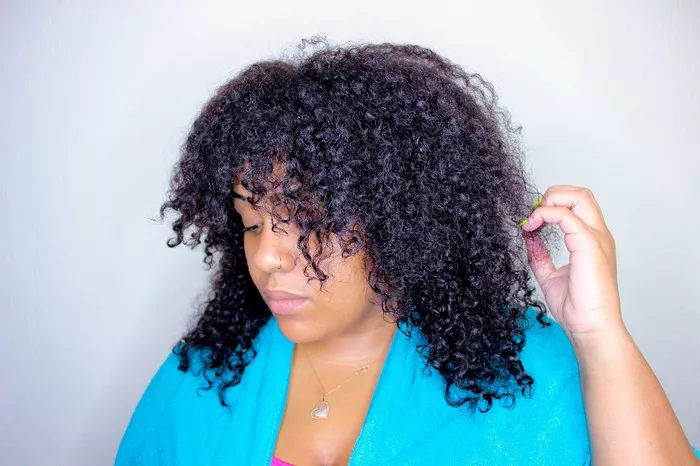Curly hair often requires special care to maintain its health and define its natural texture. Among the many products available, silicone-based formulas frequently come under scrutiny. This article explores the role of silicone in hair care, its potential effects on curly hair, and whether it’s a friend or foe for those with beautiful curls.
Understanding Silicone in Hair Products
What Is Silicone?
Silicones are synthetic compounds derived from silicon, a natural element found in sand and rocks. In hair care products, silicones serve various purposes:
Smoothing: Silicones create a barrier around each hair strand, smoothing the cuticle and reducing frizz.
Shine: They enhance hair’s shine by reflecting light.
Detangling: Silicones help in detangling hair, making it easier to comb or style.
Humidity Resistance: They can provide some degree of humidity resistance, helping to keep frizz at bay.
Types of Silicones
Not all silicones are created equal. They can be categorized into two main groups:
Water-Soluble Silicones: These can be washed out easily with water and do not leave a heavy residue. Examples include dimethicone copolyol and behenoxy dimethicone.
Non-Water-Soluble Silicones: These are more difficult to remove and may require clarifying shampoos. Examples include dimethicone and cyclopentasiloxane.
The Impact of Silicone on Curly Hair
Potential Benefits of Silicones for Curly Hair
Despite the controversies, silicones can offer several advantages for those with curly hair:
Frizz Control: Silicones create a barrier that can help keep humidity out, reducing frizz in various weather conditions.
Moisture Retention: By sealing the hair cuticle, silicones can help lock in moisture, promoting healthier-looking curls.
Protection: They provide a protective layer against environmental factors, heat styling, and physical damage.
Potential Drawbacks of Silicones for Curly Hair
While silicones can have benefits, there are also notable downsides:
Build-Up: Non-water-soluble silicones can lead to product build-up over time, making hair feel weighed down and dull. This can be particularly problematic for curly hair, which tends to be drier and may require more moisture.
Lack of Moisture: Some silicones can prevent moisture from penetrating the hair shaft, leading to dryness over time.
Difficult to Clean: To remove build-up caused by silicones, you may need to use clarifying shampoos more frequently. These can strip the hair of its natural oils, further exacerbating dryness.
Are Silicones Bad for Your Curls?
Curly Hair Needs
Curly hair is often drier than straight hair because natural oils have a harder time traveling down the hair shaft. This means that many people with curly hair require products that offer hydration and nourishment without weighing the hair down.
Personal Experience Matters
Whether silicones are beneficial or harmful can vary greatly from person to person. Some individuals with curly hair may find that silicones help control frizz and add shine, while others may experience build-up and dryness.
See Also: Can Split Ends Be Repaired? Understanding Hair Health and Care
How to Determine if Silicone Is Right for Your Curls
Assess Your Hair Type
Understanding your specific hair type and needs is crucial:
Fine, Curly Hair: If you have fine curls, heavy silicone products might weigh your hair down. Opt for lightweight, water-soluble silicones instead.
Thick, Curly Hair: If your curls are thicker and more resilient, you may benefit from non-water-soluble silicones that can offer more frizz control and protection.
Evaluate Product Ingredients
When selecting hair products, check the ingredient list for silicones. Look for:
Water-Soluble Silicones: These are generally a safer option for curly hair as they rinse out easily and are less likely to cause build-up.
Avoid Non-Water-Soluble Silicones: If you notice that your hair feels heavy or lacks moisture, consider avoiding products with non-water-soluble silicones.
Managing Silicone Build-Up
If you choose to use products containing silicones, it’s essential to manage build-up effectively:
Use a Clarifying Shampoo
To prevent product build-up, incorporate a clarifying shampoo into your routine every few weeks. This type of shampoo can remove excess silicones and other residues from your hair.
Moisturizing Treatments
Follow up clarifying treatments with deep conditioning masks to restore moisture and elasticity to your curls.
Alternatives to Silicone for Curly Hair
If you decide that silicones are not suitable for your curls, there are plenty of alternatives to explore:
Natural Oils
Natural oils, such as argan oil, coconut oil, and jojoba oil, can provide moisture and nourishment without the build-up associated with silicones.
Humectants
Ingredients like glycerin and aloe vera attract moisture from the environment, helping to hydrate your curls without weighing them down.
Silicone-Free Products
Many brands now offer silicone-free alternatives designed specifically for curly hair. Look for products labeled as “curly girl friendly,” which often prioritize moisture and curl definition.
Conclusion
Silicone is not inherently bad for curly hair; it all depends on your hair type, the specific silicones used, and how your hair reacts to them. While silicones can offer benefits such as frizz control and moisture retention, they may also lead to build-up and dryness if not managed correctly.
Ultimately, it’s essential to experiment with different products and ingredients to find what works best for your unique curls. By paying attention to your hair’s needs and adjusting your routine accordingly, you can achieve healthy, beautiful curls that thrive, whether you choose to incorporate silicones or explore alternative options.
You Might Be Interested In
- Does Longer Hair Look Thinner? Unraveling the Myths and Facts
- Does Long Hair Make You Look Older? Debunking the Myths
- Does Your Hair Grow Quicker if You Cut It? Uncover the truth


